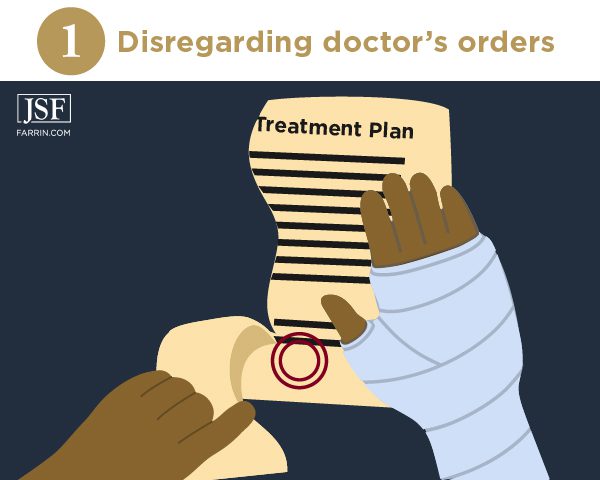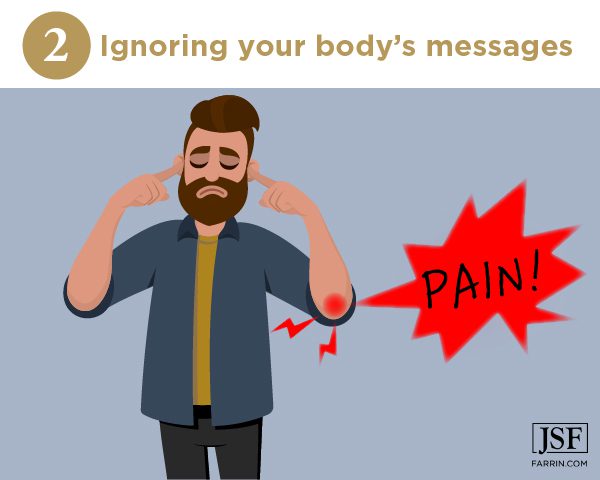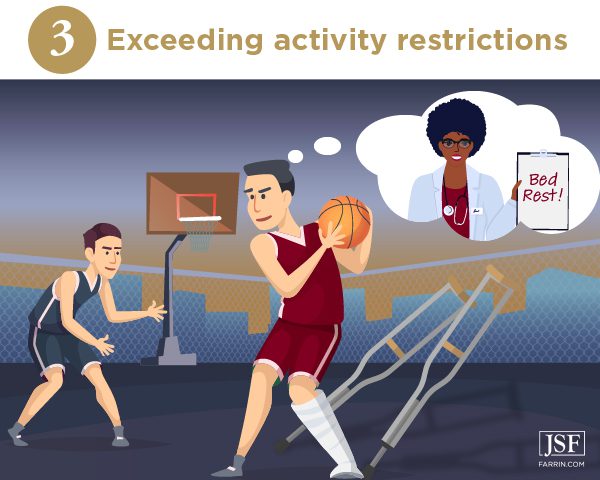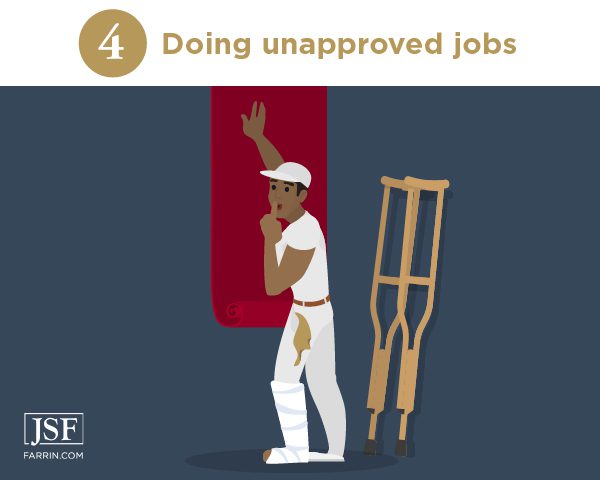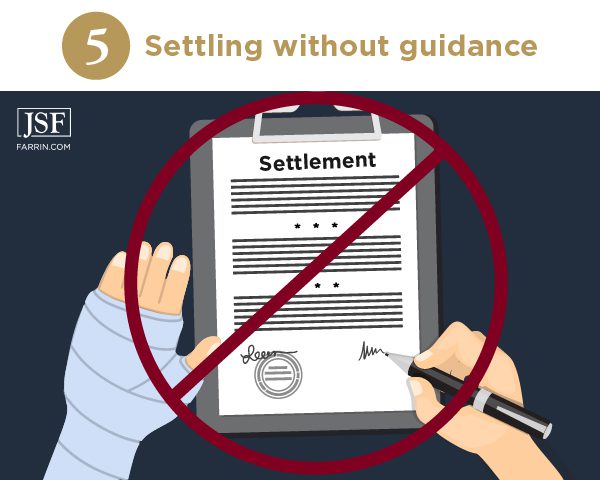So you’ve been awarded workers’ compensation for an injury at work or work-related illness. Unfortunately, there are several things you can do that threaten to reduce or even discontinue your workers’ compensation benefits. Here are five mistakes you should avoid while on workers’ comp:
- Disregarding doctors’ orders
- Ignoring what your body is telling you
- Exceeding activity restrictions
- Doing unapproved jobs
- Settling without guidance
NOTE: If you’re suffering from a workplace injury and just starting your workers’ compensation claim, here’s where you can find information about how to file and how a workers’ compensation lawyer can help you.
Mistake #1: Don’t Just Disregard Doctors’ Orders
Don’t ignore the doctor’s orders or fail to follow your treatment plan or it can be used against you.
Your potential workers’ compensation benefits include a workers’ compensation doctor who will diagnose your injury, recommend medical treatment, determine what jobs and activities you can and cannot perform due to your work injury, and assign you a rating. The catch, here, is that the insurance company picks the doctor, so none of this may be as easy or as straightforward as it sounds.
Let’s break these things down, as there are nuances you should absolutely be aware of.
Diagnosis and Treatment Recommendations
If approved for benefits, you’ll be sent to a treating doctor who will examine you, diagnose your injury, and prescribe treatment. This is the heart of workers’ comp. The insurance company pays for related treatment so an injured worker can eventually return to work, but they pick the doctor.
The treating doctor’s treatment plan is intended to be your path to recovery or, in severe cases, the path to maximum medical improvement. Some doctors may want you back on your feet and back to work as quickly as possible – remember, they’re appointed by the insurance company who’s paying benefits while you’re unable to work.
Your approved workers’ compensation claim and benefits hinge on your adherence to prescribed treatment, even if you don’t agree with it. So go to the treatments. Attend physical therapy. Don’t ignore the doctor’s advice; follow the treatment plan, and don’t perform activities that go against the doctor’s restrictions.
If you disagree with the diagnosis or treatment plan, see #2 below.
Work Recommendation
Once your workers’ comp doctor has diagnosed you and begins treatment, they may clear you for “light duty work” or just “light duty.” This is a type of medical authorization for you to work, but with specific limitations on tasks you can perform. This will likely result in your employer calling you back to work. Don’t ignore the call to work – it could result in your benefits being suspended. However…
Lighter or lessened responsibilities aren’t something many employers are equipped to offer or know how to do. It’s often a case of, “Come back to work and we’ll find something for you to do.” That’s likely a trap, whether your employer understands it or not. While the insurance company is motivated to get you back to work as soon as possible, that may not be in your best interest and could put you at risk of re-injury.
Fortunately, the workers’ compensation system has protections in place for preventing insurance companies and employers from rushing injured workers back to work in positions that are not suitable. Don’t ignore how your body feels, mistake #2 to avoid.
Disability Rating
At the end of your medical treatment, the doctor may assign a disability rating based on your injury, the treatment provided, and any lingering impairment. While the medical provider determines the percentage impairment within certain guidelines, the doctor selected by the insurance company may be conservative and assign an incorrect or lower rating. This lower rating may ultimately mean less money in your pocket. Don’t simply assume the disability rating you’re assigned is fair.
Mistake #2 Don’t Ignore What Your Body Is Telling You
You know how you feel, what hurts, and what you can do – and you probably don’t know how much you can do without increasing your pain or complicating your injury. You’re entitled to medical care for an approved claim, but some insurance company doctors may not inspire a lot of confidence.
While you need to answer a call to work, you need not simply suffer through treatment your body is telling you is wrong or not helping. You have options when the doctor diagnoses your injury and prescribes treatment that you feel is incorrect, insufficient, or otherwise unsuitable. Don’t miss the chance for a second opinion. Listen to your body.
The law provides you with opportunities to seek independent medical diagnoses and treatment advice, but there are specific steps you need to take. Also, it is important not to fall in the trap of agreeing to a second opinion with a doctor selected by the insurance company. If you don’t already have a workers’ compensation attorney and this situation arises, I recommend contacting one immediately.
Mistake #3: Don’t Perform Activities Beyond Your Doctor-Imposed Restrictions
A workers’ comp claim is a balancing act. You’re too hurt to work, and specifically too hurt to perform your regular job responsibilities. An easy way, then, for an injured worker to wreck a workers’ comp claim is to get caught performing restricted activities. Don’t ignore the doctor’s restrictions on activities.
You might wonder how anyone would know you performed a restricted activity. Here’s how.
The Insurance Company May Be Watching
That’s right. Insurance companies may be keeping an eye on injured workers – if not in person with a private investigator, then at least online through social media. If you’re receiving benefits for an injury, and the insurance company can demonstrate that you don’t actually have that injury, they may seek to stop your benefits.
Don’t give the insurance company any reason to believe you’re not injured.
Going on Vacation While on Workers’ Comp
When you’re in the midst of a workers’ comp claim, you can’t work. You’re supposed to be resting and recovering. What better way to do that than go on vacation? Yes and no. There is no rule or law against going on vacation while you’re on workers’ comp. It may even benefit your health, but you need to keep a few important things in mind.
- Try to avoid missing doctors’ appointments and treatments. If you’re going to travel or take a vacation, make sure you plan around the appointments. If you are going to miss an appointment, it is better to notify the provider as soon as possible, so that it can be rescheduled.
- The insurance company may be watching you. As noted above, you may be monitored while receiving workers’ comp benefits. If your injury makes sitting for long periods difficult, a several-hour plane ride to an exotic destination sends a bad signal. Likewise, hiking Machu Picchu shouldn’t be in the cards if you can’t be on your feet for long periods.
- Context matters. Even if you’re on vacation and acting within your prescribed limitations, what you post or what you’re doing may be taken out of context. For example, if you’re at Disney World and in a wheelchair while traveling around the park, don’t get out of the chair to take pictures. Out of context, it may look like you were walking around the park when you should have been in a wheelchair due to your injury.
Mistake #4: Don’t Lie About Side Jobs
Sometimes, people ask if they can work side jobs while receiving workers comp benefits. This is another thing insurance companies monitor strictly, and for good reason. Workers’ comp wage benefits are meant to replace the money you cannot earn due to injury.
It stands to reason that if you can make money doing something else, you’re not unable to earn, at least partially. Generally, don’t do side work when you’re in a workers’ comp case. Not only can it hurt your case, but it may also constitute fraud! And yes, private investigators may be looking for this kind of thing.
Here’s a good resource if you’re looking for more information about working while on workers’ comp.
#5 Don’t Settle Your Claim Without Consulting a Lawyer
Don’t sign anything without taking advantage of a free case evaluation from an attorney first. It’s very easy to sign something and not know that you’re harming or ending your case.
Insurance companies and employers want you back to work. They want your treatment over, and your case closed. For-profit insurers want to stop paying out of their pockets and into yours. This is especially important in cases of permanent disability. Don’t be fooled into settling your case for less than you may deserve.
If you suffer a work injury, you don’t have to wonder what to do next, and you don’t have to pay for a helpful case evaluation from an attorney. This way, you can decide if you want our help without ever paying a dime.
What CAN You Do While Receiving Workers’ Comp?
Between your employer, medical providers, and insurance companies, you may think there’s absolutely nothing you’re allowed to do while you’re on workers’ comp. That’s not true! Your work injury does limit you, certainly. But it doesn’t necessarily prevent you from doing things.
The trick is to know what you are allowed to do within your work restrictions. Here are a few common questions:
Can I go get groceries while on workers’ comp?
You can go get groceries on workers’ comp as long as nothing you do violates your doctor’s orders. If you have limits on your mobility or heavy lifting that would forbid lifting or carrying grocery bags, consider asking for help or using an available grocery delivery service. If, for example, you are prohibited from lifting more than 20 pounds and can walk around and drive without trouble, groceries are probably an errand you can run – just make sure the bags are light.
Can I drive?
If your injuries do not limit your driving ability, and your doctor allows it, you can drive. Be aware that it may be okay to drive short trips but not long distances, depending on your condition. For example, if your doctor says you should not remain seated for long periods of time, don’t attempt to drive a long distance to see family – or at least make sure you stop frequently if your doctor provides that as a solution. Remember – you could be under surveillance!
Or, if your vehicle has a difficult entry or egress – such as a tall truck or small car – consider if the mere act of entering or exiting the car might contradict your treatment. Refer to doctor’s orders.
Can I go to the gym?
You probably can’t go to the gym unless your injury is particular in what it limits. For example, if you have an injury to your hand, you may be able to hit the gym and work on your legs, get on the treadmill, etc. If your injury is to your back, going to the gym is probably a no-no. Ask your doctor. And get the answer in writing, if possible.
Can I mow the lawn?
It’s not likely that you’re going to be allowed to mow the lawn after a workplace injury, as the activity involves a number of body parts working together, and an injury to any of those parts may make the activity a non-starter. Consult your doctor. Mowing will also have you outside in full view of possible surveillance. Not a great idea. This is a service you may consider paying for or asking a neighbor, friend, or family member to help.
Can I pick up my children/grandchildren?
You can probably pick up children or grandchildren if you do not have a prohibition on bending or lifting their weight. You may not be able to play sports and the like. You can still spend special time with your children or grandchildren without putting your claim at risk. Watch movies or shows. Read to them. Make sure you’re not exceeding your limits – you want to recover your health as much as possible and have a long future with them. As always, ask your doctor if you have any doubt whatsoever, and get the answer in writing if possible.
Whatever the activity, when in doubt, don’t.
Never Assume the Insurance Company Is on Your Side
If you’re dealing with a work injury, you may need help. And while the insurance company may seem like the right place to find it, they’re protecting their own interests. Most want to minimize the benefits they have to pay. And your employer wants you back to work sooner than later.
You want someone in your corner. We were recognized on U.S. News’ 2024 “Best Law Firms” list for worker’s compensation, and that’s no accident.4 Our experienced, professional team treats every client and case with compassion and determination. Let us evaluate your claim and provide some clarity. It’s fast, it’s easy, and it costs nothing to see if we can help. Call 1-866-900-7078 now.
You May Also Be Interested In
Can I Go to the Gym While on Workers’ Comp?
What Not to Say to Your Workers’ Comp Doctor: 4 Things to Avoid



